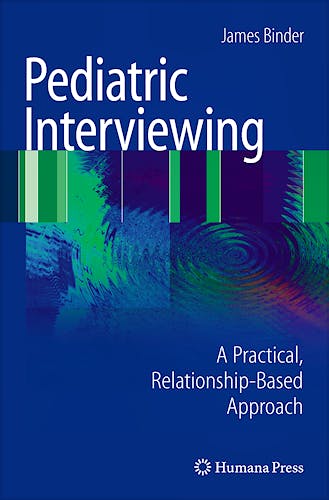

No hay productos en el carrito



Pediatric Interviewing
Binder, J.
1ª Edición Marzo 2010
Inglés
Tapa blanda
188 pags
1000 gr
null x null x null cm
ISBN 9781607612551
Editorial SPRINGER
LIBRO IMPRESO
-5%
103,99 €98,79 €IVA incluido
99,99 €94,99 €IVA no incluido
Recíbelo en un plazo de
2 - 3 semanas
About this book
- Offers comprehensive coverage for all issues regularly encountered by clinicians during the pediatric interview
- Includes accessible and compelling case examples
- Based on relationship theory, the foundation of successful clinical interviewing
- Outlines strategies and provides a wide range of practical tips for producing a smooth, effective pediatric interview
- Emphasizes the importance of seamlessly combining the biological and psychological aspects of patient care
Clear and effective communication in a clinical context has enormous benefits, and especially in pediatrics, where assessing patients’ symptoms is more challenging. Clinicians who interview well gather extra data, to be sure, but also gain from a number of other positive outcomes, from happier patients to fewer law suits.
The unique perspective on pediatric interviewing offered in this book reflects the author’s breadth of training and experience, which includes being a solo pediatric practitioner for ten years and completing a residency in psychiatry and child psychiatry. Currently associate professor of pediatrics at the Marshall University School of Medicine, Prof. Binder has taught pediatrics and interviewing to successive generations of medical students. His easy-to-read, compelling, and comprehensive guide outlines effective strategies for interviewing parents and children efficiently. Topics covered include engaging patients and families, efficiently and smoothly obtaining a history of present illness and making a good differential diagnosis, uncovering hidden agendas, collaborative discussion in diagnosis and treatment, practicing family oriented care, taking a full social history, and all other aspects of carrying out the pediatric interview.
Offering clear, practical tips and a wide range of targeted case examples, this invaluable title seamlessly combines the biological and psychological aspects of patient care. Based on relationship theory, the underlying foundation of successful clinical interviewing and a major determinant of optimal diagnosis and treatment, this is an indispensable guide for all clinicians engaged in the care of children and adolescents.
Written for » Professional/practitioner
Keywords » Adolescents - Children - Communication - Evaluation
- History - Interview - Patient-centered phase - Pediatric - Relationships -
Roter - Shut-down interviews
Related subjects » Internal Medicine - Medicine - Pediatrics
Table of contents
Foreword
Preface
Acknowledgments
Chapter 1 - The Shut-Down Interview and Relationships
Chapter 2 - The Medical Interview: The Opening Phase
Talking with children
Chapter 3 - History of Present Illness
Chapter 4 - Discussing Diagnosis and Treatment with Families during the Concluding
Phase of the Interview
Chapter 5 - Assessment of Family Functioning/Talking to Families
Chapter 6 - The Well-Child Visit
Chapter 7 - Primary Care and Child Mental Health
Chapter 8 - Sensitive Topics: Suicidality, Child Abuse, Sexuality, Substance
Abuse
Chapter 9 - Supporting Families Expressing Grief while Giving Bad News
Chapter 10 - Challenging Patients
Chapter 11 - Wandering Interviews
Chapter 12 - Using Experiential Techniques to Teach Interviewing Skills
Chapter 13 - Glossary of Terms
Chapter 14 - Appendices
A. Increasing Efficiency while obtaining a History of Present Illness
B. Chonological Assessment of Suicidal Events (CASE)
C. Sample Curriculum for Teaching Interviewing Skills in a Small Program Structure
© 2025 Axón Librería S.L.
2.149.0